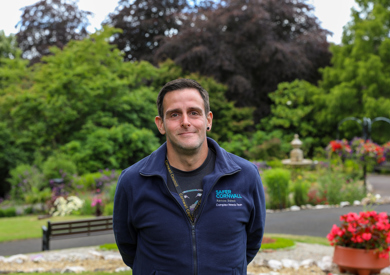Tailored employment support (IPS)
If you've experienced challenges with drugs or alcohol, we may be able to support you to find employment.

How we can support you
As part of the work we do in our drug and alcohol services, we can support you with any employment needs you might have.

Advice to enhance your CV writing, interviewing or job searching

Support to complete job applications
What is an IPS service?
IPS stands for Individual Placement Support. It’s an intensive employment support programme, designed for people who want to work, but find it difficult to get a job or keep a job.
Individuals are given access to a dedicated Employment Specialist who will provide tailored support to help the individual into work.
Our Employment Specialists work closely with local employers, and match individuals to potential work opportunities. They also provide ongoing in-work support to both the employer and employee.
When I was offered a job it felt amazing. I’ve gained so much
from this service. I now see that I’m more capable than I ever thought I was. I’ve never felt this happy.
Mike, WithYou IPS service user, 56
Through the IPS programme, we offer:
- Zero exclusion - you can access IPS support at any stage of your treatment with us
- Rapid job search - we aim to support fast entry into a job of your preference
- Benefit support - we can support you with a better off calculation, benefits advice and guidance
- Employer engagement - we approach local employers and support you to get an interview
- Integration with key workers - the employment specialist will work closely with your recovery worker
- Competitive employment - we aim to support you into roles that are permanent and offer a competitive salary
- In work support - we offer time unlimited in-work support, making sure you are fully supported in your employment.
- Individualised support - your employment specialist will tailor support to you and your needs
We also work closely with employers to improve their understanding of employing people who may have a substance use or any personal, physical, neurodiverse or cultural needs, and so that they can make any reasonable adjustments for you.

Who can access the IPS service?
The IPS service is currently available to anyone accessing our drug and alcohol services in the following locations. Speak to your recovery worker or DWP coach who will be able to connect you to the service. You can also self refer - contact details can be found on each local services information pages which you can find using our service finder.
What happens after I am referred?
If you are referred to our IPS service, you will initially be contacted by one of our Employment Specialists. They will arrange to meet with you, either in our service building or, if you prefer, it can be in a community location where you feel comfortable. You can also ask your Recovery Worker to attend.
Your first meeting
The first meeting will be an opportunity for the Employment Specialist to hear more about your personal situation and to understand what your employment goals are. They will ask you about the types of job or career you’d like and talk to you about the different ways we can support you. Together you will agree on a plan and next steps.
Your journey into employment
Your Employment Specialist will be in regular contact with you to talk about how the plan is progressing and to let you know about any opportunities that might be coming up. They will be with you side-by-side throughout your journey into employment.
Continued support when you're in work
Once you have secured a job, the Employment Specialist will keep in contact with you. They will make sure you are getting all the support you need, and if the job isn’t right for you, help you to find other employment.
Contact your local drug and alcohol support service
Use our service finder to locate your nearest service.
Contact one of our 80 local services across England and Scotland for free, non-judgemental support and advice.
Not ready for an in-person service? Chat to one of our trained recovery workers online to get free, confidential advice and information.